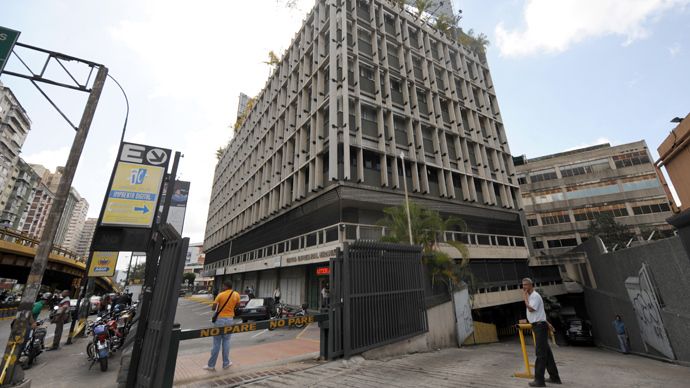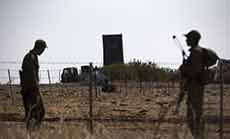Eye on the Enemy: Employee at a military clinic: Sick leaves for Kinder Chocolate

IDF Weighs Interceptors for Offshore Gas Platforms
By YAAKOV KATZ
Fearing missiles, Navy seeking budget for 4 new vessels to improve defense coverage of Mediterranean Sea.
The IDF is considering the deployment of missile interceptors on gas rigs that "Israeli" companies plan to construct in the eastern Mediterranean Sea in the coming years, The Jerusalem Post has learned.
"Israel's" concern is that Hizbullah will try to attack the platforms with anti-ship missiles or explosives-laden vessels.
The navy is particularly concerned about Syria's recent purchase of the Russian Yakhont anti-ship missile, which could be transferred to Hizbullah and used to target the gas rigs. Syria already tested the Yakhont in recent maneuvers. The weapon is said to be a sophisticated missile with a range of about 300 km.
Last February, the navy seized an Iranian arms ship whose cargo, "Israel" said, was destined for Islamic Jihad. The vessel was carrying six Iranian Nasr-1 radar-guided anti-ship missiles.
The navy has yet to decide which type of missile defense system it would deploy on the gas rigs, but the two options under consideration are David's Sling, which "Israel" is developing for use against medium-range rockets and cruise missiles, as well as the Barak-8, which protects large navy vessels against anti-ship missiles.
The navy has already increased its patrols in the Mediterranean and is also using unmanned aerial vehicles (UAVs) to increase the range of its surveillance. It currently operates Israel Aerospace Industries' Heron UAV, which comes with a special electro-optic payload for maritime operations.
Until now, the navy has focused on protecting "Israel's" sea lines of communication (SLOC), which span the length of the Mediterranean and around the Magreb region of North Africa. Some 99 percent of all goods arriving in the country come by sea, including security-related supplies and military hardware.
"The area we will need to protect at sea will significantly increase with the construction of the new gas rigs," a senior naval officer said.
"We are also very concerned with the military buildup in the region, which is seeing an increase in sophisticated weapons systems like anti-ship missiles."
In addition, the navy is in talks with the Defense Ministry about the need for four new vessels to more effectively cover its new area of operations. It is seeking a larger platform than the Sa'ar 5-class corvettes it operates.
The vessel will have to accommodate an advanced radar system, a helicopter and a launch system capable of firing long-range air defense and surface-to-surface missiles.
The navy has also informed the energy companies that it will need to install radars on the gas rigs, and the government is considering ordering the companies to help finance some of the cost.
In February, the Defense Ministry and navy ordered the Israel Electric Corporation to bolster security around a natural gas buoy that is being built off the coast of Hadera. The buoy will enable "Israel" to import natural gas in place of Egyptian gas, which has come to a near standstill since the revolution in Egypt last year.
_________________
Lebanese targets fair game in war with Hizbullah'
Jerusalem Post , By YAAKOV KATZ
Defense officials: It was a mistake not to have made this clear during the Second Lebanon War in 2006.
"Israel" will attack Lebanese government targets during a future war with Hizbullah, senior defense officials said amid speculation that a war could erupt in the North following a future strike on Iran's nuclear facilities.
"It was a mistake not to attack Lebanese government targets during the [Second Lebanon] War in 2006," a senior defense official explained. "We will not be able to hold back from doing so in a future war."
After the outbreak of the 2006 war, the official said, the US asked "Israel" to refrain from bombing Lebanese government targets so as not to weaken the prime minister at the time, Fuad Siniora, who was aligned with the West.
"Israel" complied and restricted its bombings to Hezbollah targets.
"This will not be the same in the future, particularly now that Hizbullah and the government are effectively one and the same," the official said.
In general, the IDF has significantly boosted its "target bank" since the 2006 war. Today's bank is said to contain thousands of Hezbollah targets, compared to the approximately 200 that the IDF had on July 12, 2006, when Hizbullah abducted reservists Eldad Regev and Ehud Goldwasser.
Hizbullah is believed to have amassed over 50,000 rockets and missiles, and most of the weaponry is thought to be stored in some 100 villages throughout southern Lebanon.
The new thinking regarding bombing government institutions is part of a revised IDF strategy on how to damage Hizbullah and facilitate a faster end to a war than the 34 days it took in 2006. The guerrilla group, which embeds its military capabilities within civilian infrastructure, does not have a clear power base, which if destroyed could help end such a war.
Talk of the possible bombing of Lebanese government targets comes as "Israel" prepares for a possible war with Hizbullah that could result from either an "Israeli" strike against Iran's nuclear facilities or a preemptive strike to stop the transfer of sophisticated weaponry from Syria to Lebanon.
Western countries have prepared various contingency plans for such a scenario, including the possible bombing of a convoy if it were detected, as well as the possible insertion of commando forces to secure the chemical stockpile if and when Syrian President Bashar Assad falls.
_______________
Finance Ministry: NIS 9.5 million to improve conditions of settlements' security coordinators
"Israel" Hayom - Shlomo Tzesna
The Ministry of Finance recently ratified a raise of NIS 9.5 million to improve the conditions of the current military security coordinators in the head-on settlements. The money will be used to increase the salaries with retroactive effect, starting January 2013.
The decision of increasing the budget of the military security coordinators was taken in the wake of the current tour of the Director General of the Ministry of Defense Major General in the reserves, "Udi Shani" in the settlements around Gaza a few months ago; where he discovered there are great difficulties.
The head of the settlement unit in the Ministry of Defense, "Amickam Sparski" said yesterday in an interview with "Israel" Hayom, "he is talking about a significant increase in the salaries of coordinators, which reflects the pressure of security in which they live in, and honors the work of the defense establishment .. ".
ـــــــــــــــــــــــــــــــــــــــــ
Employee at a military clinic: Sick leaves for Kinder Chocolate
Channel 2
The local units of investigating economic misdemeanors and police investigators are looking into a charge against a medical team at a clinic in Beer al Sabeh; an employee has granted medical services to soldiers by providing them sick leaves (permission given to the soldier to remain at home for rest or hospital) in exchange for bribes. According to the charge, the employee at the clinic used to accept candy bars as bribery from the soldiers as well, as reported the newspaper "Yediot Ahronot".
According to the charges, the doctors who serve in the clinic has sold a three-day sick leave for 150 shekels, and distributed the money among themselves. The testimonies of the soldiers who were investigated for their involvement with the case showed that in some cases the doctors didn't approve on any sick live, but a member of the staff in the clinic did. She received a one-of-its-kind bribe: candy, such as a Kinder chocolate egg.
In view of that, several soldiers were arrested on charges of involvement in trading sick leaves, including a soldier who was demobilized a while ago. The Soldier denied the charges against him, saying he did not give any candy to the employee in exchange of a sick leave.. "
ــــــــــــــــــــــــــــــــــــــــــــــ
Colonel running over a soldier, ignores the accident
Lilach Shoval - Israel Hayom
"The military police of investigation" is scrutinizing the circumstances of a car accident happened in March near the headquarters of West Bank Task Force , when a colonel ran over a soldier standing beside the road. The soldier claimed that after the car hit him, the officer walked away and after a few seconds he stopped but did not offer any help.
On the same day, the soldier was transferred for medical treatment after he suspected having broken ribs and an injury in his knee tendon. One of his relative filed a suit to the military police claiming that he doesn't trust the internal investigation. Sources in the "Israeli" army noted that the soldier rushed toward the road and crashed into the car, and then the driver stopped to see what happened.
When it became clear that the soldier can stand up on his feet, the driver continued driving.
This incident has been published for the first time by the reporter of Kol Yisrael radio,"Carmela Menashe." "Israeli" army spokesman said in response, "The subject us under investigation at the military police, and in the end results will be transferred to be examined by the military prosecutor."
Source: Hebrew newspapers, translated and edited by moqawama.org




